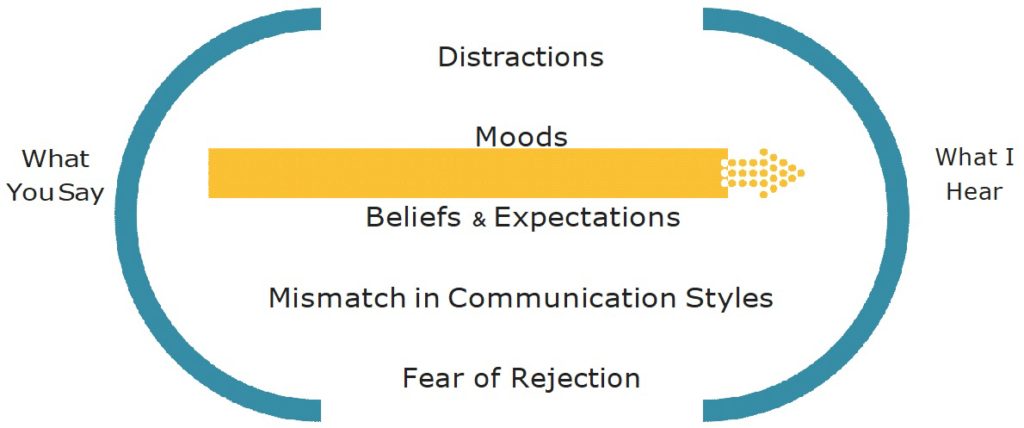As you know, communication in couple relationships can be very hard at times! Many couples who end up in couples therapy report this to be their biggest challenge.
For every couple, there is a difference between what one partner says and what the other partner hears.
This “gap” in communication may be big or small, and it exists because no two people can ever view or interpret the same situation in the same way.
Within the gap, there are “filters” or factors that color the way we hear our partner and they way they hear us.

Read on to learn more about some of the common filters that create communication gaps in couples.
This info is based on the classic relationship book Fighting for Your Marriage by experts Markman, Stanley, & Blumberg.
Distractions
Simply put, distractions include anything that takes your attention away from what your partner is communicating to you.

There may be things in your environment competing for you attention – like noisy kids or pets – as well as internal distractions making it hard to pay attention – like feeling hungry or still thinking about work.
What distractions get in your way of fully hearing your partner? How do these impact the communication between you two?
How can you minimize or eliminate these distractions?
Moods
Moods can have a big impact on your relationship communication.

Not surprisingly, bad moods can really put a strain on things, making it much harder to fully hear each other and interpret what you’re hearing in a positive light. On the other hand, good moods can help you communicate by making you more open to listening and cutting your partner some slack when they mess up.
When you’re in a negative mood, how does it impact your relationship communication? For example, do you tend to get more quick-tempered? Or ignore him or her altogether?
What can you do differently the next time your mood negatively impacts your communication?
Beliefs & Expectations
In every relationship ever, what we expect or assume to be true about our partner is what we tend to see.

A fancy psychological term for this is “confirmation bias.” This describes something that we all do: pay attention to things which confirm beliefs that we already hold and bring to each situation.
For example, if you believe that your partner can’t be trusted – because of past relationships or past breaches of trust in THIS relationship – you’ll tend to only see evidence that appears to confirm your belief and you’ll tend to ignore any evidence that counters it. This can be very unfair to both your and your partner.
Personal beliefs and expectations help explain why you and your partner (and anyone else for that matter!) will never see the same situation exactly the same way. Or hear that same words in the same way!
Because of our various experiences that shape our beliefs and expectations, we all hear and interpret things differently.

What negative beliefs and expectations impact how you hear your partner?
How can you keep these beliefs and expectations in check? How would that help your communication?
Mismatch in Communication Styles
Couples communication is oftentimes strained simply by differences in the communication styles of partners.
These differences may be due to different personality traits (e.g., introverted vs. extroverted), each of your families-of-origin (e.g., growing up in a family of loud talkers), or any other factors that make you and your partner different from one another.

When you have different communication styles it may, at times, widen the gap in communication between you two. You may very well interpret something your partner says in a VERY different way than how he or she meant it.
How would you describe your personal communication style? And how would you describe your partner’s style?
Are there times when your style clashes with your partner’s and creates communication problems? How can you work with this toward better communication?
Fear of Rejection
Communication can go wrong when you or your partner don’t clearly communicate what you feel or need. This may happen due to fear of each other’s reactions, or fear of being rejected by each other.

When we communicate in unclear or passive ways, we are often trying to self protect. By hiding our true feelings, we can preserve our own self-esteem and try to shield ourselves from being hurt or rejected. We often to do this without realizing it.
However, this filter creates a communication gap and can lead to lots of misunderstandings.
Are there times that you have a fear of being rejected by your partner? If so, how does it tend to impact your communication with him or her?
Being more assertive in your communication (not aggressive… there’s a difference!) helps with this filter.
How can you communicate in more assertive ways with your partner while also showing love and respect?


